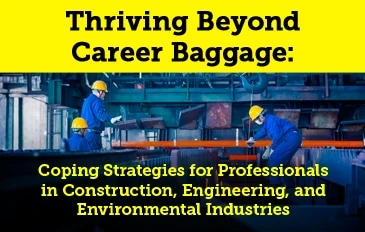Thriving Beyond Career Baggage: Coping Strategies for Professionals in Construction, Engineering, and Environmental Industries

Thriving Beyond Career Baggage: Coping Strategies for Professionals in Construction, Engineering, and Environmental Industries
The construction, engineering, and environmental industries are known for their demanding nature and high-pressure environments. As professionals in these fields, it’s not uncommon to experience career baggage, which can hinder personal growth and professional success.
In this comprehensive blog post, we will explore effective coping strategies specifically tailored to the challenges faced by individuals in the construction, engineering, and environmental industries. From resilience-building techniques to seeking support and embracing personal growth, we will provide actionable tips and insights to help professionals overcome career baggage and thrive in their careers.
- Acknowledge and Understand Your Career Baggage: The first step in coping with career baggage is to acknowledge and understand the challenges you’re facing. Take the time to reflect on past experiences, setbacks, or disappointments that may be impacting your mindset and professional growth. Identify any emotions, beliefs, or self-limiting thoughts associated with these experiences. By gaining awareness of your career baggage, you can begin the process of healing and moving forward.
- Reframe Setbacks and Failures: Reframe setbacks and failures as opportunities for growth and learning. Instead of dwelling on past mistakes, focus on the valuable lessons they provide. Embrace a growth mindset that sees challenges as stepping stones to success. Recognize that setbacks are a natural part of any career journey and that they can ultimately lead to personal and professional development.
- Seek Support and Mentorship: Don’t hesitate to reach out for support and guidance from mentors, colleagues, or industry professionals. Seek individuals who have faced similar challenges and can offer insights based on their experiences. Engage in open and honest conversations to gain fresh perspectives and advice. Join industry-specific associations, networking groups, or online communities where you can connect with like-minded professionals who can provide support and encouragement.
- Invest in Continuous Learning and Development: Continuously invest in your professional development and skills enhancement. Stay updated with the latest industry trends, technologies, and advancements. Attend conferences, seminars, and workshops to expand your knowledge. Pursue additional certifications or advanced degrees to demonstrate your commitment to growth. The process of continuous learning not only enhances your expertise but also boosts your confidence and empowers you to overcome any perceived limitations.
- Practice Self-Care and Well-being: Prioritize self-care and well-being to maintain a healthy work-life balance. Engage in activities that promote physical, mental, and emotional well-being. Make time for regular exercise, relaxation techniques, and mindfulness practices to manage stress effectively. Set boundaries to prevent burnout and create a supportive environment that nurtures your well-being. Remember that taking care of yourself is crucial for long-term career success and fulfillment.
- Set Realistic Goals and Celebrate Achievements: Set realistic and achievable goals aligned with your personal and professional aspirations. Break them down into smaller milestones to track your progress. Celebrate your achievements, no matter how small, as a way to acknowledge your hard work and maintain motivation. Avoid comparing yourself to others, as each career journey is unique. Focus on your individual growth and progress.
- Embrace Resilience and Adaptability: Develop resilience and adaptability as essential skills in coping with career baggage. Learn to bounce back from setbacks and navigate challenging situations. Embrace change and embrace new opportunities for growth. Cultivate a positive attitude and a willingness to adapt to changing circumstances. Focus on developing problem-solving skills and a flexible mindset that allows you to thrive in the face of adversity.
Michael DeSafey is a leading executive recruiter for professionals in the construction, engineering, and environmental industries. He is currently the President of Webuild Staffing: www.webuildstaffing.com. To learn more about Michael, or to follow his blog, please visit www.michaeldesafey.com.
